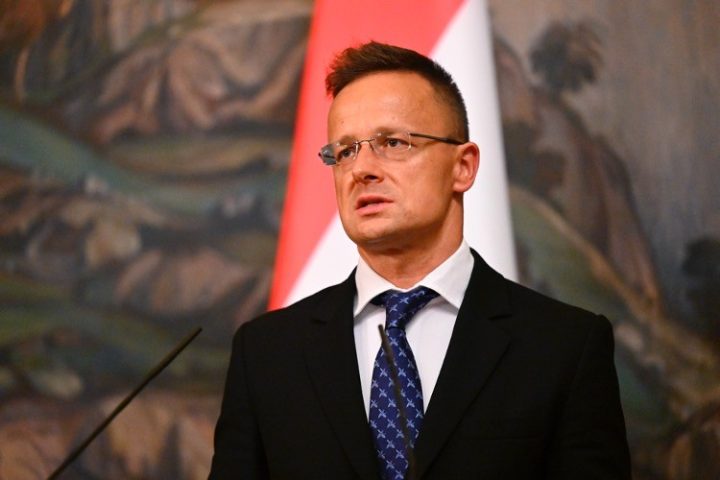
On February 3, Hungarian Foreign Minister Péter Szijjártó decried Brussels at a conference in Baku for its inaction that he claimed was obstructing energy diversification. On February 5, MEP Balázs Hidvéghi from Hungary’s governing Fidesz party slammed the European Union (EU)’s suggested embargo on Russian fossil fuels as “life-threatening, untenable, and flawed,” according to reports from Daily News Hungary.
Once again, the Budapest-Brussels fracas regarding energy sanctions has erupted, as the EU is preparing its 10th sanctions package to counter Moscow, under which the European Parliament suggested a “full and immediate embargo on all fossil fuels and uranium” from Russia.
During the parliamentary vote on the measures, Fidesz refrained from voting because “this was the latest of many impossible texts we should have given our opinion on,” Hidvéghi declared in a public radio interview.
Hidvéghi asserted that the suggested measures would only lead to a “dangerous and untenable situation.” The embargo would not likely catalyze the collapse of Putin’s regime and cease the war, he said, but rather would be “suicidal and harmful to us, slowly ruining the security and quality of life of Hungarians and Europeans, to the point of collapse.”
A small, landlocked country, Hungary depends immensely on Russian oil and gas arriving through pipelines as it does not have other infrastructure to import adequate supplies from elsewhere. Budapest thus far has been able to refrain from all energy sanctions the EU imposed on Russia, but simultaneously is hoping to divert away from Russian energy as soon as possible, including by exploring alternatives such as the Southern Gas Corridor. Yet the Corridor project still suffers from a dearth in essential development funds that come mainly from Brussels.
Previously, Szijjártó attended an international conference about the Southern Gas Corridor and green energy investments in Baku, Azerbaijan, where he admitted that for the majority of Central Europe, the only way toward energy diversification was through Azeri gas — provided its extraction takes place “without delay,” while Southeastern Europe still needed “significant network development.”
Budapest even inked a memorandum of understanding with Baku before the conference to show its commitment to the Corridor. Nonetheless, to ensure that Central Europe’s energy diversification plans materialize, Brussels “must do its homework” too, said Szijjártó.
Apart from Hungary, Szijjártó said that Bulgaria, Romania, and Slovakia will also try to appeal to the European Commission together to pressure the EU to offer the financial framework required to assure Central European energy security and independence from Russia as well as prioritize this matter.
“If the European Union is not only using diversification as a tool for political communication,” Szijjártó said, “then it is high time that Brussels act and finance the necessary infrastructure development in south-eastern Europe, enabling the involvement of Azerbaijani gas extraction.”
Nevertheless, Hungary’s EU funds negotiator on Monday indicated a further possible delay in access to billions of euros of recovery money, claiming that settling outstanding issues with Brussels over democratic reforms could last until the summer.
Hungary is qualified to obtain around 5.8 billion euros ($6.2 billion) in free grants and a further 9.6 billion euros in cheap loans from the EU, but the bloc has suspended any payments until Budapest acquiesces to EU demands. For example, a senior EU official claimed that Hungary must enhance the independence of its judiciary “very soon” to obtain any of the 15.4 billion euros allocated to Budapest from the EU’s Covid recovery stimulus.
Tibor Navracsics, the minister in charge of funding talks with the EU, told the business daily Vilaggazdasag that Hungary’s parliament could pass the next tranche of judicial reforms in March after discussions with EU officials.
“Parliament has until March to pass legislation on judicial independence. As far as I know, the Justice Ministry and the European Commission are in continuous contact regarding the contents of the package,” he was cited as saying.
He said that it was unclear whether that batch of legislation would be adequate to alleviate the Commission’s concerns.
When questioned about media reports on a further delay in access to EU funds until the second half of the year, the minister said he anticipated all outstanding issues with the EU Commission to be settled by the summer, later than a previously mentioned April deadline.
“I expect this to be an ongoing negotiation, over the course of which we time and again will have to change some laws or reach agreements to move forward and get the funds flowing,” Navracsics replied.
Hungary and Poland are the EU’s only member states that still have not obtained the aforementioned EU funds, amid long-standing denunciations from the left-leaning European Commission that their governments do not espouse the globalist and supranationalist ideologies that the EU embodies.
Last month, Hungarian Prime Minister Viktor Orbán said that his country will veto any EU sanctions against Russia involving nuclear energy, based on reports from state radio.
Ukraine has urged the 27-nation EU to include Russian state nuclear energy company Rosatom in sanctions. However, Hungary, which has a Russian-built nuclear plant it plans to expand with Rosatom, has vetoed that.
Orban reiterated in an interview that sanctions on nuclear energy “must obviously be vetoed.”
“We will not allow the plan to include nuclear energy into the sanctions be implemented,” the Hungarian premier said. “This is out of the question.”
Additionally, Hungary’s Paks nuclear power plant has four small Russian-built VVER 440 reactors with a total capacity of about 2,000 megawatts, which began operating between 1982 and 1987.
The plant obtains its nuclear fuel from Russia.
Under a deal inked in 2014 with Russia, Hungary hopes to expand the Paks plant with two more Russian-made VVER reactors with a capacity of 1.2 gigawatts each.



